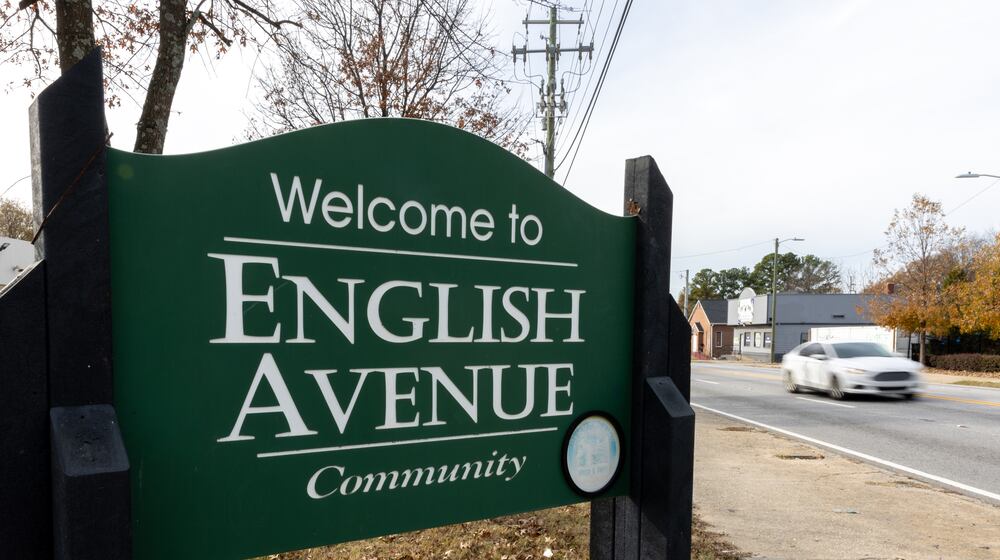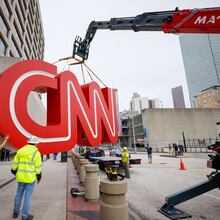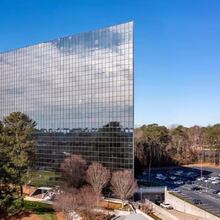Standing in the doorway of the insurance company he has owned for 44 years, Wellington Howard has seen everything Auburn Avenue has to offer, both good and bad.
When he opened his Georgia Insurance Brokerage, the one-time black hub was bustling — less prosperous than in the days when John Wesley Dobbs was the “Mayor of Auburn Avenue,” but full of people trying to make their way in a demographically changing Atlanta.
“When I got here, there were six barbershops on this block. Now you will be lucky to find one,” Howard said, surveying the abandoned and gutted Silver Moon Barbershop across the street (“The Oldest Black Shop in Atlanta: Since 1904).”
Running along the pavement that separates them is a set of shiny new tracks, where the Atlanta Streetcar is soon to run. The 1.3-mile light rail system will transport riders between Centennial Olympic Park and the Martin Luther King Jr. National Historic Site — passing close to the World of Coca-Cola, CNN Center, the Georgia Aquarium and several spots along historic Auburn Avenue.
City officials, planners and long-time property owners hope the rail line will bring an infusion of tourists to Sweet Auburn, transforming abandoned and rundown buildings into thriving shops and restaurants.
“There is going to be a whole new business environment down here that is going to cater to the neighborhood surroundings,” Howard said. “You got college kids around here now. You have Old Fourth Ward, which has brought in a higher income. You are not going to see a lot of barber shops, beauty parlors and bars around here anymore. Well, maybe you will see an oyster bar.”
Across the street, Tegagne Haile stands in the doorway of the Sweet Auburn Grocery, which he has owned for 25 years. He is not so happy. For him and many shop owners, construction of the tracks, which required most of the street to be gutted and closed for long stretches of time, meant a loss of business and valuable parking spots.
He runs inside the grocery and returns flailing a loaf of injera, the spongy flat bread that is a staple of every Ethiopian meal.
“We used to sell hundreds of these, because people would just park on the street, run in and just throw me money. Now, if we sell 10, we are lucky,” Haile said. “What a joke this project is to me. Helping black people on Auburn Avenue is fiction. If you believe that, you believe in fairy tales.”
Boom to bust
But integration, the lure of the suburbs and the intrusion of the I-75/85 Connector, which bisected Auburn Avenue, changed all that. They reduced the street — which Fortune magazine described in 1956 as "the richest Negro street in the world" — to a crime-ridden slum.
Professional offices and retail stores gave way to take-out joints, pool halls, bars and night clubs, anchored on either end by the King historic district and the Auburn Avenue Research Library of African-American Culture and History. At night gamblers, hustlers, drug dealers, addicts and prostitutes took over.
“Even now, when I walk out of here at night I see those girls out there with three strings or nothing on,” said the Rev. Bessie Donaldson, program coordinator for the Big Bethel Saturday School Initiative. “I knew Auburn Avenue when it was a vibrant. It was really nice at one time, but we started leaving and got less interested in our community.”
Promises, promises
Before the streetcar, there were other projects that promised to pump fresh life into Auburn Avenue. Some failed to materialize at all; others happened but didn't deliver the anticipated results.
The most recent is the $45 million Renaissance Walk, a mixed-use development that combined lush condominiums and street-level retail spaces. Built on the site of the onetime Palamont Motor Lodge, on land owned by Big Bethel, it opened in 2007. The recession arrived in 2008.
Faced with a dearth of buyers for its condo units, the project shifted toward rentals. The 30,000 square feet of retail space remained largely empty. Eventually, the bank foreclosed and resold to a new set of investors.
“Since that building was built, none of those store fronts have been open for business,” said Haile, who was asked to rent space in Renaissance Walk for more than twice what he currently pays across the street.
Last month, Tom Moore — the manager of Renaissance Walk, which will soon to be rechristened City Walk — watched as two construction workers prepared to make renovations on the ground level. Moore admitted that while the development’s Piedmont Avenue side features a Moe’s, Pizza Hut and Smoothie King, it has been tough to attract business to the Auburn Avenue side.
But he said that’s changing: Several bidders are lined up for the anchor restaurant space, and the retail spaces will soon house boutiques, tea and coffee shops and pop-up tenants.
Kareen Harris, who has owned a condo in the complex since it opened, is satisfied. “I got what I expected here,” said Harris, who plans to open a restaurant and bar across the street. “As a historian, I knew what Auburn Avenue used to be like. I took a hit, but it will be good.”
Clean sweep
Atlanta City Councilman Kwanza Hall, who represents the area, blames several factors for Auburn Avenue’s decades of decay: zoning constraints, crime, lack of private and public investment, and the fact that large swathes of property are owned by organizations rather than individuals.
He’s aware of streetcar skeptics but insists that the project will deliver as promised. “People didn’t believe it was ever going to happen,” Hall said. “But this has been demonstrated as the type of investment that produces positive outcomes. In five years, I anticipate a very vibrant and bustling street.”
Crime — or the fear of crime — probably represents the biggest threat to those hopes, as Hall well knows. He said APD has already started to increase patrols around the area in hopes of cleaning it out completely once tourists start arriving.
One of the biggest nighttime gambling spots is an abandoned storefront next door to the grocery store owned by Haile, who has been accused of allowing the crime to fester.
“Crime is everywhere,” the grocer said in response. “We are the only store in downtown that has never been robbed. We know the robbers.”
The price of progress
The idea of a streetcar line in Atlanta became a reality in 2011 when the U.S. Department of Transportation awarded the city a $47.6 million grant to build it. The final tab will be closer to $100 million, thanks to necessary sewer improvements and rising construction costs.
The streetcar is tentatively scheduled to begin accepting passengers this summer.
For many shops — from Wok & Roll Chinese to Will’s Way Creole Kitchen to Style-Rite Hair Studio — the construction period has been rough. Pal’s Lounge, which has been at the center of Auburn Avenue since the 1920s, has been closed since mid-2013.
“The streetcar is a great thing. It makes sense,” said Devon Woodson, the fourth-generation owner of the blues and jazz bar. “But it was the process that concerned me. It has been two years of construction on Auburn Avenue. You put more than $90 million into this project, but what did the community and property owners who endured the hardships get?”
Woodson, who still hasn’t re-opened although the street is no longer closed down, estimates he has lost more than $100,000 as a business and property owner since 2012. He plans to re-open later this year as Pal’s Lounge & Café/2100 Juke Joint. He is also applying for money from the $5 million Downtown Façade Improvement Grant Program through Invest Atlanta. It will provide two-thirds of the cost to any qualifying business that makes improvements designed to upgrade its curb appeal.
“They told us to look toward the future, over the horizon,” Woodson said. “But the community was left to fend for itself.”
Hope on rails
Down the street, Auburn Avenue veteran Sonya Jones of the Sweet Auburn Bread Company is practicing patience. She said she, too, suffered from the street closings, but used the time to expand the catering side of her business.
“The last couple of years have been a struggle, but I have been for the streetcar since day one,” said Jones, as she whipped up a batch of biscuits. “Because it will eventually bring more business to the area. I am anxious and looking forward to it.”
Community activist Mtamanika Youngblood, who has lived in Sweet Auburn for 29 years, welcomes the streetcar and the newcomers it may bring. Still, she would rather see investments in the area that reflect the history, culture and architecture that are particular to Auburn Avenue.
“Revitalization and development is going to happen, but being true to the legacy of the street is what makes us unique,” Youngblood said. “We don’t want to look like Midtown. That is nice, but what is special about that?”
About the Author





